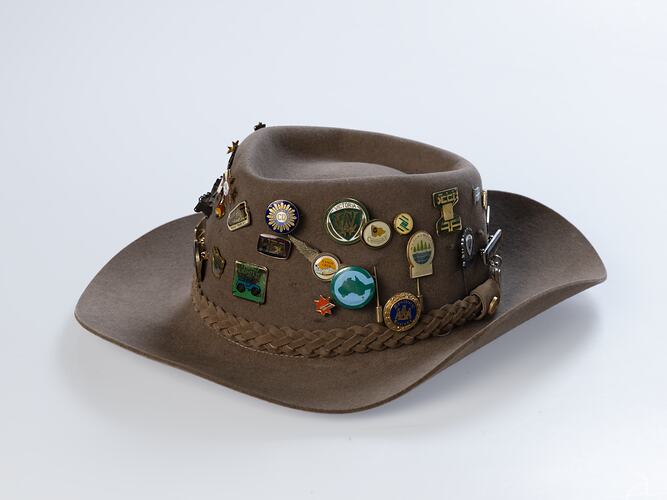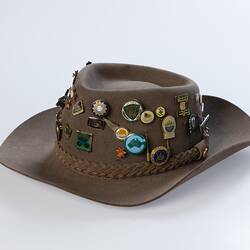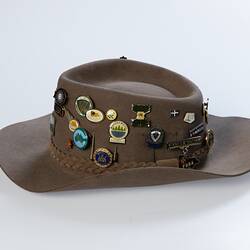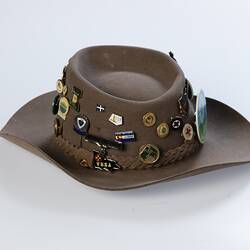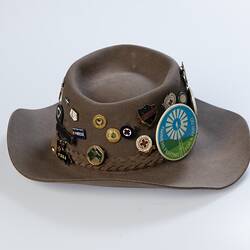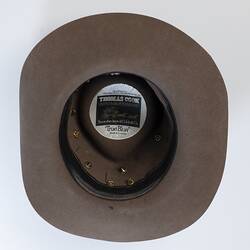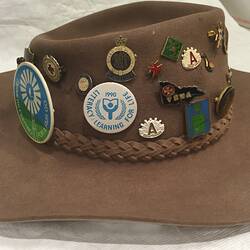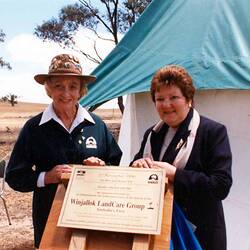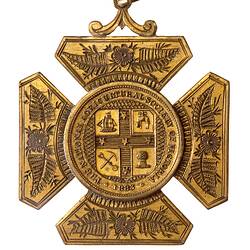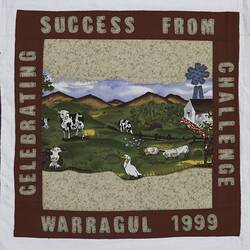Summary
Akubra hat owned and worn by Heather Mitchell when actively involved in agri-politics in Victoria in the 1980s. It was made or sold by Thomas CookBoot and Clothing Co.
Heather Mitchell was the first female President of the Victorian Farmers Federation (1986-1989) and joint inaugural Chair of Landcare Victoria with Joan Kirner.
Fourty badges are attached to the hat which reflect key issues and associations of importance to Heather Mitchell, including the National Farmers Federation, Victorian Farmers Federation, Australian Red Cross Society, Longernong Agricultural College, Country Fire Authority Victoria, Victorian Bush Nursing Association, Country Women's Association, Greening Australia and Conservation and Natural Resources Victoria.
The hat was presented to Museums Victoria by Deirdre Brocklebank, Heather's daughter, at the Hopetoun Women on Farms Gathering in 2016.
This is the first artefact collected for the Invisible Farmer Project. The Invisible Farmer Project was the largest ever study of Australian women on the land, uncovering the histories and stories of Australian women in agriculture. It began as a pilot project (2015-2016) and evolved into a three year (2017-2020) nation-wide partnership between rural communities, academic, government and cultural organisations, funded by the Australian Research Council.
Physical Description
Akubra hat with 39 badges.
Significance
This hat was worn by one of the most celebrated and influential women in Australian agriculture, who was an important Victorian contributor to the Australian Rural Women's Movement in the 1980s-1990s. The Akubra hat is also an iconic and gendered symbol of rural Australia and the 'man on the land'. In adopting this Akubra as her public persona Heather Mitchell directly and successfully challenged the gendered nature of rural Australia and the role of women in it. The hat is also a compact and colourful document of community action - 40 badges represent a diversity of social, medical & community organisations from across Australia and overseas and illustrate significant ongoing issues affecting culture and society.
More Information
-
Collection Names
Victorian Women on Farms Gathering Collection, Invisible Farmer Project Collection
-
Collecting Areas
Sustainable Futures, Politics & Society, Working Life & Trades, Clothing & Textiles, Politics & Society, Medicine & Health
-
Owner
Mrs Heather Mitchell OBE AM, Horsham, Victoria, Australia, 1980s
-
Organisation Named
-
Maker (Probable)
Cook, Thomas, Boot & Clothing Company., Nunawading, Melbourne, Victoria, Australia
-
Individuals Identified
Meredith Hayes
-
Recording Details
Interview, 2:41:35 HH:MM:SS, Excellent, Recording in three parts.Transcript is available.
-
Inscriptions
Label in centre of crown: 'Outfitters to / "The Man from Snowy River 2" / THOMAS COOK / BOOT & CLOTHING CO / Since the days of Cobb & Co / 'True Blue" / Made in Australia' Label on inside hat band: '100% PURE RABBIT FUR FELT / SUPER FINE QUALITY / * * * / GENUINE LEATHER SWEAT BAND' Lime green size label attached to inside hat band: '53'
-
Classification
-
Category
-
Discipline
-
Type of item
-
Overall Dimensions
345 mm (Length), 310 mm (Width), 112 mm (Height)
-
References
Brocklebank, Deirdre, 'Tell Tales. Memoirs of Hopetoun Victoria 1950s-70', ISBN 9780646548852. Extracts supplied by author 7.9.2016. [Link 1] Viewed 7.9.2016. [Link 2] Viewed 7.9.2016. [Link 3] Viewed 7.9.2016. [Link 4] Viewed 7.9.2016. [Link 5] Viewed 7.9.2016.
-
Keywords
Women's Associations, Agriculture, Women on Farms Gatherings, Women's Work, Women's Role, Women's Issues, Agricultural & Farming Organisations, Agricultural Colleges, Agricultural Finance, Agricultural Merchandise, Agriculture & Farming, Health & Well-Being, Healthcare & Medicine, Community Organisations & Services, Community Groups, Rural Conditions, Rural Life, Rural Women, Rural Victoria, Environmental Activism, Environmental Issues, Environmental Management, Political Demonstrations, Political Organisations, Political Rallies, Sustainability, Sustainable Agriculture, Hats, Nursing, Hospitals, Hospital Fundraising, Hat Pins, Red Cross, Scouting Movement
